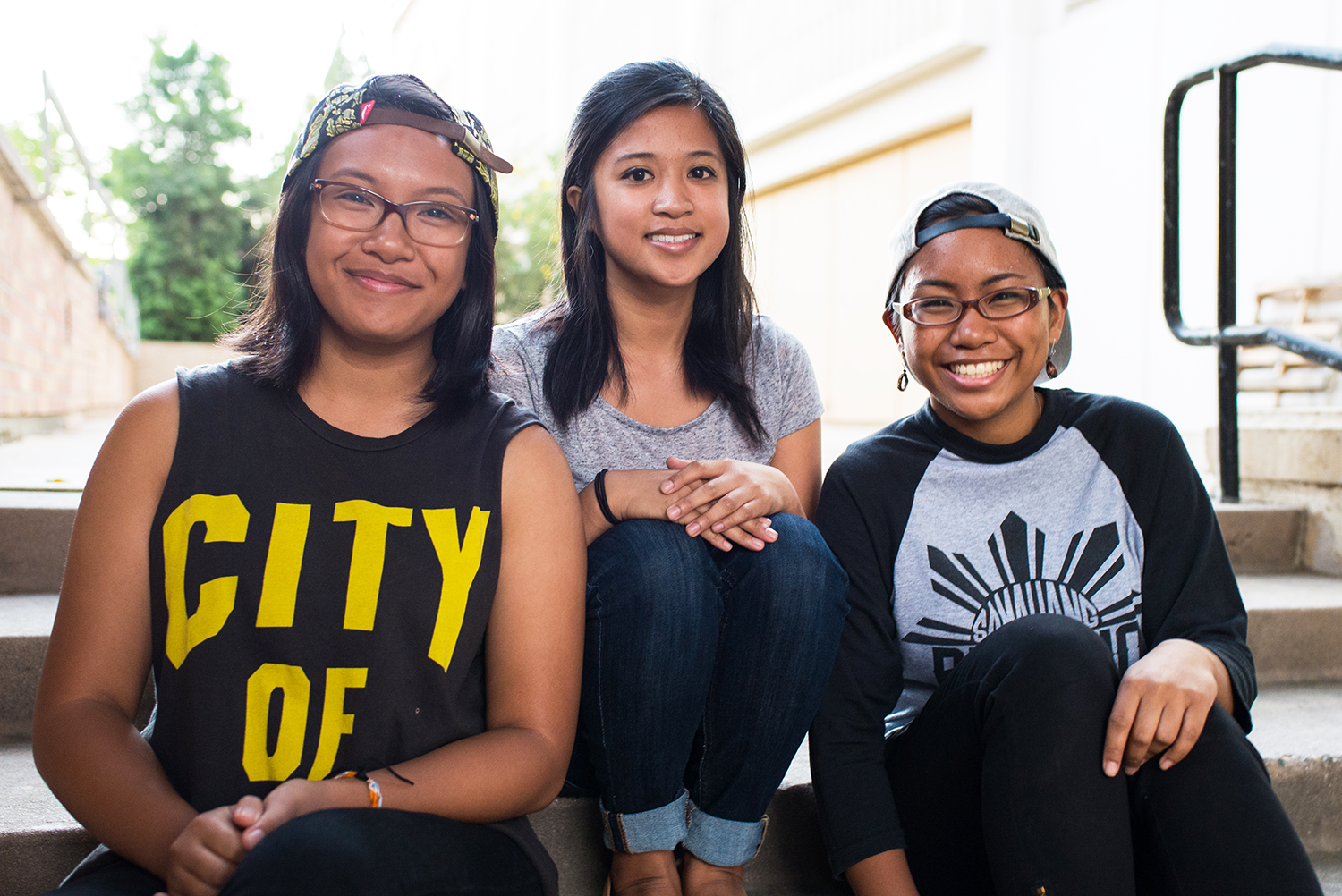A Collective Goal
Millions of Filipinos are still without homes and jobs 11 months after the typhoon that devastated the islands of Leyte and Samar.
Filipino student groups at UCLA said they will support ongoing rehabilitation through fundraising, but in a different climate than existed when students raised $6,000 just after Typhoon Yolanda struck the Philippines last November.
The UCLA Mabuhay Collective, a network of Filipino student organizations, will host a memorial around the first anniversary of the storm in early November to honor victims of the typhoon, which destroyed 1.1 million homes and killed more than 6,200 people.
“We have a really strong community that wants to keep working toward relief,” said Antonette Sadile, a fourth-year Asian American studies student and president of Samahang Pilipino.

Fourth-year sociology student Winnie Galbadores, fourth-year Asian American studies student Antonette Sadile and third-year Asian American studies student Marien Padua worked on Typhoon Yolanda relief efforts last year and plan to continue this year.
Last January, Associated Students UCLA agreed to donate up to $6,000 by giving a portion of students’ UCLA Store purchases to Typhoon Yolanda relief efforts if they used a special coupon during the first week of February. The additional money brought the total donations to $12,000.
We have a really strong community that wants to keep working toward relief.—Antonette Sadile
The decision to dole out the funds followed a major push from students, including former Undergraduate Students Association Council President John Joanino, who was a member of Samahang Pilipino.
A $20 DONATION
A donation of $20 after the typhoon may have been used to buy:
- 6.4 official death certificates that can help Filipinos qualify for death benefits.
- Enough seeds to plant 45 gardens.
- A third of a piglet that can be raised for food.
- 2 sacks of garden fertilizer.
- 5 gallons of gas away from the disaster zone.
- 1 gallon of gas in the disaster zone in the few weeks following Typhoon Yolanda.
- 20% of the full cost of a toilet that provides safe sanitation.
Samahang Pilipino External Vice President Winnie Galbadores, a fourth-year sociology student, said navigating the power structures on campus, such as USAC and ASUCLA, can be difficult, but the Filipino community on campus has an advantage when it comes to representation in student government.
“It truly helps to have representation in USAC,” she said. “Without that title and those powers, it would have been really hard to do what we did last year.”
The move to provide donations was not without its detractors. Many members of the ASUCLA Board of Directors, which voted in favor of donating up to $6,000 to the cause, raised concerns over the board’s lack of official policy on donating to charities at the behest of students.
ASUCLA changed its donation policy in April to strongly discourage any direct monetary donations in response to some board members’ concerns over the fairness of using student fees for charitable causes, even when students advocate for the donations.
Typhoon Yolanda was the first international disaster toward which ASUCLA donated money, but it was not the first time it wrote a check for victims of a disaster.
It was definitely our history of student activism and looking into the past, seeing other student organizations organizing to get something we want. It made me believe we could raise the money.—Marien Padua
The student union donated $100 UCLA Store gift cards to all UCLA students displaced by Hurricane Katrina in 2005, and donated all proceeds from patriotic merchandise after the 9/11 attacks.
How to help in natural disasters
Vicki Penwell, founder of Mercy in Action, and Elmer Sayre, the in-house advisor for the Water, Agroforestry, Nutrition and Development Foundation, helped respond to the devastation caused by Typhoon Yolanda. According to them, here are some things to keep in mind when trying to help people recover from disasters.
- Don’t go to the disaster zone unless you have a skill that will help.
- If you go to the disaster zone, try to bring food and supplies for yourself so you are not taking goods from the locals.
- If you want to send physical goods, first learn what is needed. Don’t send anything that is expired or broken.
- Know where your donation goes and how it will be used. Immediately after a disaster, money is needed for emergency supplies and services, but in the months and years following money is still needed for long-term recovery.
- If possible, give to a person or organization that you know and trust.
The association can still donate percentages of sales from specific items, as it did for 9/11 relief, or proceeds from optional customer contributions similar to the coupon system it implemented after Typhoon Yolanda.
Even without the prospect of directly matched donations, the Filipino student organizations on campus are situated well to continue fundraising efforts this year, Sadile said.
Samahang Pilipino has been an active student organization on the UCLA campus for more than 40 years.
“It was definitely our history of student activism and looking into the past, seeing other student organizations organizing to get something we want,” said Marien Padua, Samahang Pilipino’s PINAYS coordinator and a third-year Asian American studies student. “It made me believe we could raise the money.”
After the donation drive organized by the Typhoon Haiyan Relief Committee last year, Samahang Pilipino sold shirts and bracelets as part of its 2014 Typhoon Yolanda campaign and used the funds to send a member to the Philippines to do relief work.
The Mabuhay Collective said it hopes to keep working on Typhoon Yolanda recovery efforts by taking over selling the shirts and bracelets and by holding a memorial, Galbadores said. Its partnerships with other progressive organizations on campus should also help the group meet its goals, she added. ■
